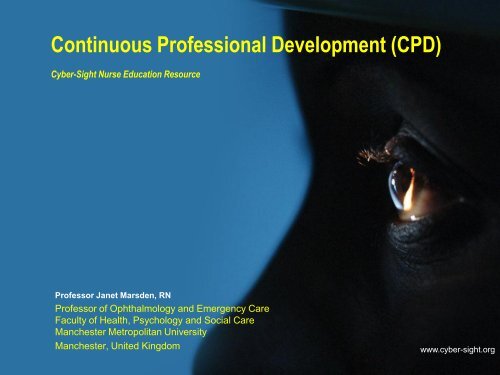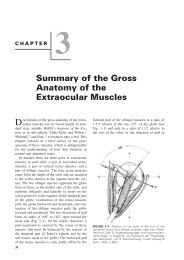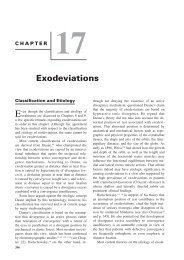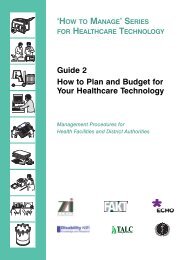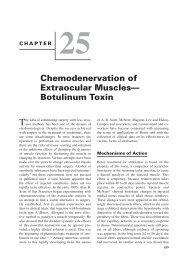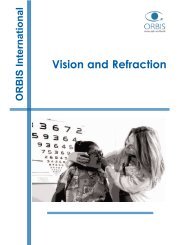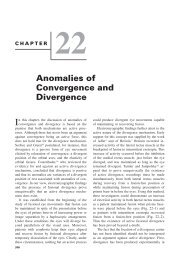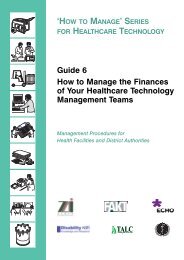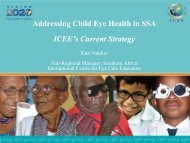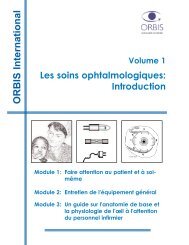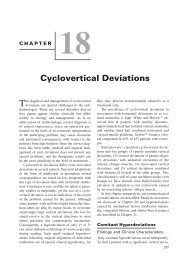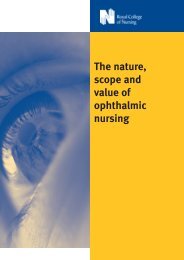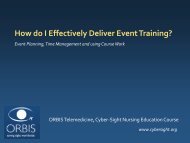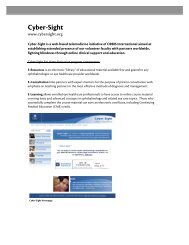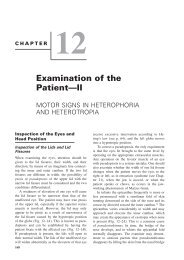Why is CPD Important for Nursing? - Cyber-Sight
Why is CPD Important for Nursing? - Cyber-Sight
Why is CPD Important for Nursing? - Cyber-Sight
You also want an ePaper? Increase the reach of your titles
YUMPU automatically turns print PDFs into web optimized ePapers that Google loves.
Continuous Professional Development (<strong>CPD</strong>)<br />
<strong>Cyber</strong>-<strong>Sight</strong> Nurse Education Resource<br />
Professor Janet Marsden, RN<br />
Professor of Ophthalmology and Emergency Care<br />
Faculty of Health, Psychology and Social Care<br />
Manchester Metropolitan University<br />
Manchester, United Kingdom<br />
www.cyber-sight.org
<strong>Why</strong> <strong>is</strong> <strong>CPD</strong> <strong>Important</strong> <strong>for</strong> <strong>Nursing</strong><br />
Practice moves on, we need to keep up or our practice becomes<br />
outdated<br />
Job sat<strong>is</strong>faction<br />
Knowledge <strong>is</strong> power<br />
The need to spread new knowledge with others<br />
In the modern world of evidence based<br />
practice, we must not get left behind<br />
www.cyber-sight.org
<strong>Why</strong> <strong>is</strong> <strong>CPD</strong> <strong>Important</strong> <strong>for</strong> <strong>Nursing</strong><br />
The purpose of <strong>CPD</strong> <strong>is</strong> to enhance the quality of care that patients<br />
receive from health care practitioners<br />
There <strong>is</strong> a link between the application of <strong>CPD</strong> outcomes to practice<br />
and high quality care and service<br />
<strong>CPD</strong> helps to advance practice by introducing new techniques and<br />
processes<br />
www.cyber-sight.org
What Is Evidence Based Practice<br />
It‟s not hearsay<br />
It‟s not the result of a single (bad) paper<br />
It‟s not what you are told to do<br />
It‟s not what we‟ve always done<br />
It <strong>is</strong> - a careful consideration of all the in<strong>for</strong>mation available<br />
and a dec<strong>is</strong>ion based on th<strong>is</strong> and the particular situation in<br />
which the clinician and patient find themselves<br />
www.cyber-sight.org
So What <strong>is</strong> Evidence<br />
How do we know what we know<br />
We use:<br />
Common knowledge – that which we all know<br />
Experiential knowledge - such as how to swim or ride a bicycle:<br />
the things we learn by experience which will always be part of what<br />
we know.<br />
Mutual knowledge – how we all know that spiders are more<br />
frightened of us than we are of them<br />
Craft based knowledge – that which goes with the job<br />
Tacit knowledge – that which we don‟t know we know<br />
Formal knowledge – the systematic exploration and sifting of<br />
evidence<br />
www.cyber-sight.org
Knowledge in Real Life – and Work<br />
In “civilian” life and in professional life we use all three sorts of knowledge.<br />
Common knowledge<br />
Experience<br />
Scientific knowledge<br />
www.cyber-sight.org
Different Types of Evidence<br />
Common knowledge<br />
– Clinical observation…..and real life<br />
Experience<br />
– Clinical observation…..and years of practice<br />
Scientific knowledge<br />
– National and international research<br />
– Local research<br />
www.cyber-sight.org
Finding Evidence<br />
Guidelines<br />
Service<br />
Evaluation<br />
Case studies<br />
Small scale<br />
studies<br />
Random<strong>is</strong>ed<br />
Controlled<br />
Trials (RCTs)<br />
Expert<br />
opinion<br />
Summaries of<br />
evidence<br />
Clinical<br />
experience<br />
Systematic<br />
Reviews and<br />
metaanalys<strong>is</strong><br />
www.cyber-sight.org
Formal Knowledge -<br />
National and international Research Studies<br />
Widely available<br />
Systematic review<br />
Rigorous ()<br />
Accessible<br />
Research priorities<br />
Local relevance<br />
Timeliness<br />
www.cyber-sight.org
Formal knowledge - Local Research Evidence<br />
Small-scale studies to investigate a local problem<br />
Whole population sample<br />
Rigour<br />
Nature of outcomes and claims to their applicability<br />
www.cyber-sight.org
In<strong>for</strong>mal Knowledge - Clinical Observation<br />
Examples of clinical observation knowledge:<br />
Heat helps to break down posterior synechiae<br />
„deep‟ <strong>for</strong>eign body sites fill with ointment and become „boggy‟ - better<br />
with drops<br />
Try to find explanations (often basic science)<br />
which explain what you observe<br />
www.cyber-sight.org
Boundaries of In<strong>for</strong>mal Knowledge<br />
Local application – sometimes <strong>for</strong> a single case<br />
Context - specific<br />
Inevitable exceptions<br />
Need <strong>for</strong> review and up-dating<br />
Possible differences in perception between team members<br />
R<strong>is</strong>k of m<strong>is</strong>interpreting the situation<br />
www.cyber-sight.org
Expert Knowledge<br />
“An expert <strong>is</strong> someone who has made all the m<strong>is</strong>takes<br />
that can be made, but in a very narrow field.”<br />
Niels Bohr<br />
www.cyber-sight.org
What Counts as Evidence<br />
Knowledge of varying nature and from a variety of sources.<br />
Claims made must be commensurate with the strength of the evidence<br />
presented.<br />
For local use and within a given context, in<strong>for</strong>mal knowledge <strong>is</strong> often<br />
both adequate and effective.<br />
For wider application, or <strong>for</strong> situations of potential major impact,<br />
stronger evidence <strong>is</strong> required.<br />
www.cyber-sight.org
Finding Evidence<br />
Standards and Guidelines Produced by Peer and License groups as a<br />
recommended practice idea<br />
Books (These can be dated so make sure you have the most up-todate<br />
book that you can find as your reference)<br />
Journal Articles (Always check the quality of the article‟s research and<br />
the quality of the journal)<br />
Internet (Be aware that the anyone can place in<strong>for</strong>mation on the<br />
internet so make sure your web-sites are reputable and up-to-date)<br />
Colleagues (Always make sure that the colleagues you ask <strong>for</strong><br />
evidence or help are also up-to-date with their standards and evidence<br />
based knowledge)<br />
Experts (Can ass<strong>is</strong>t with specific and detailed evidence because they<br />
are a special<strong>is</strong>t)<br />
www.cyber-sight.org
It has been estimated that:<br />
2 million articles are publ<strong>is</strong>hed in 20,000 biomedical<br />
journals annually and th<strong>is</strong> would <strong>for</strong>m a stack 500m high<br />
“To keep up to date with current literature a general physician would<br />
need to read and appra<strong>is</strong>e 19 original articles a day - every day”<br />
www.cyber-sight.org<br />
Davidoff F et al BMJ (1995) 310: 1085-6
We Need to be Selective about Evidence Choices<br />
What you need to do:<br />
Set objectives <strong>for</strong> <strong>CPD</strong> and find relevant evidence<br />
Share the work and your new knowledge with your team so you<br />
can work together to improve and implement practice changes<br />
You can never know enough…but you‟ll never know it all<br />
– Set real<strong>is</strong>tic targets!<br />
www.cyber-sight.org
Applying our Knowledge and Evidence in<br />
Practice<br />
What you need to do:<br />
Evaluate if the evidence you have found <strong>is</strong> „true‟ and „up-to-date‟<br />
To evaluate the evidence you need to:<br />
– Critically analys<strong>is</strong> the content and context<br />
– Examine the expert<strong>is</strong>e of the writer on the subject<br />
What you need to do to be able to apply your new knowledge to<br />
practice:<br />
To apply the evidence we need clinical expert<strong>is</strong>e<br />
D<strong>is</strong>cuss your new knowledge with your team and superv<strong>is</strong>or to<br />
determine ways to implement changes to meet the practice<br />
recommendations<br />
Continue to work with your team and superv<strong>is</strong>or and encourage a<br />
supportive „knowledge sharing‟ team culture<br />
www.cyber-sight.org
Application in Practice - Clinical Expert<strong>is</strong>e <strong>is</strong><br />
the Key<br />
Without clinical expert<strong>is</strong>e, practice r<strong>is</strong>ks becoming unsuitable or inappropriate <strong>for</strong><br />
an individual patient.<br />
Without current best evidence, practice r<strong>is</strong>ks becoming rapidly out of date, to the<br />
detriment of patients.<br />
Sackett et al 1996<br />
www.cyber-sight.org
Applying Evidence<br />
Practice <strong>is</strong> not just about the application of scientific or pseudoscientific rules<br />
Research general<strong>is</strong>es, considers probabilities, may be situational<br />
Patients are individuals<br />
Evidence <strong>is</strong> supposed to enhance practice<br />
Will the research/evidence help me in caring <strong>for</strong> my patients<br />
www.cyber-sight.org
If You Know - You Can Pass It On<br />
When you learn something new that <strong>is</strong> useful to patient care you<br />
can help continue to improve patient care by teaching and sharing<br />
your knowledge with:<br />
Hospital Staff - teach and empower<br />
<strong>Nursing</strong> colleagues …and question practice!<br />
To Patients - give them the in<strong>for</strong>mation they need<br />
www.cyber-sight.org
Experts and Practitioners are Individuals Too<br />
When seeking knowledge from experts keep in mind that:<br />
They vary in what they regard as reliable evidence<br />
Definitions of appropriate evidence reflect interests and biases<br />
Experience leads to systems of belief – evidence may challenge those<br />
beliefs<br />
Evidence may be ignored<br />
Values are important<br />
They may come from a different hospital system or background which<br />
does not reflect or apply to your practice<br />
www.cyber-sight.org
To Help Our Patients Nurses Need to<br />
Keep up to date with their <strong>CPD</strong><br />
Be open to new ideas and changes<br />
Accept evidence that conflicts with what we believe or have always done<br />
when the evidence and standards are provided and support new ideas<br />
Use evidence well<br />
Help other nurses to learn new thinks, share your new knowledge and<br />
help answer their questions<br />
www.cyber-sight.org
How Does th<strong>is</strong> Impact on Educating the Patient<br />
With up-to-date knowledge you can help the patient:<br />
Make an educated and in<strong>for</strong>mative dec<strong>is</strong>ion about their care<br />
Be com<strong>for</strong>ted to know they are receiving the best care<br />
Be aware of what to expect with the care<br />
Ass<strong>is</strong>t you to identify if their status had changed or they need help<br />
Be compliant with care when they are being empowered<br />
www.cyber-sight.org
How Can You Help the Patient through Education<br />
Employing evidence that the patient can see<br />
Talking through the „why‟<br />
Making the patient a partner in their care, rather than someone who<br />
has things done to them<br />
Making the best dec<strong>is</strong>ion <strong>for</strong> that person, with them…<br />
Empowers them - knowledge <strong>is</strong> power<br />
www.cyber-sight.org
Patients Who Feel Like Partners<br />
By educating the patient, they will feel like a partner and are likely to:<br />
Tell you more<br />
Tell you the truth!<br />
Work with you<br />
Use their medication as you‟ve agreed<br />
www.cyber-sight.org
Live as if you were to die tomorrow.<br />
Learn as if you were to live <strong>for</strong>ever.<br />
Ghandi<br />
www.cyber-sight.org
It Is Really Not a New Concept!<br />
Do not believe in anything simply because you have heard it<br />
Do not believe in anything simply because it <strong>is</strong> spoken and rumoured by many<br />
Do not believe in anything merely on the authority of your teachers and elders<br />
Do not believe in traditions because they have been handed down <strong>for</strong> many generations<br />
But after observation and analys<strong>is</strong>, when you find that anything agrees with reason and <strong>is</strong><br />
conducive to the good and benefit of one and all, then accept it and live up to it<br />
(Gautama Buddha 430 AD)<br />
www.cyber-sight.org
Quiz<br />
1. True or False: Continual Professional Development <strong>is</strong> important to help<br />
nurses make in<strong>for</strong>med and educated practice choices T/F<br />
2. True or False: Evidence can be found in reputable journals T/F<br />
3. True or False: The best colleague to ask <strong>for</strong> help <strong>is</strong> someone who does<br />
not do <strong>CPD</strong>, <strong>is</strong> not interested in change and does not work towards<br />
improving patient care T/F<br />
4. True or False: Nurses who do <strong>CPD</strong> can provide better support and<br />
education to the patients, thus empowering them to be involved in their<br />
care T/F<br />
5. True or False: If you wanted to apply research to your circumstances<br />
you can conduct small local research of your own as a means of<br />
measuring and supporting your practice improvement T/F<br />
www.cyber-sight.org
References<br />
• Sackett DL, Rosenberg JA Muir Grey JA Haynes R Brian, Scott<br />
Richardson W (1996) Evidence based medicine: what it <strong>is</strong> and<br />
what it <strong>is</strong>n‟tBMJ 1996; 312 : 71<br />
• Bohr N Quoted in Mackay A L (1994) Dictionary of Scientific<br />
Quotations London<br />
• Davidoff F, Haynes B, Sackett D, Smith R. Evidence based<br />
medicine. BMJ 1995; 310: 108,6.<br />
www.cyber-sight.org


